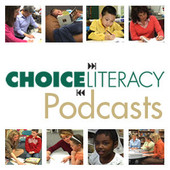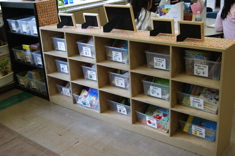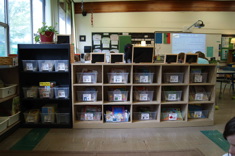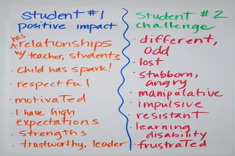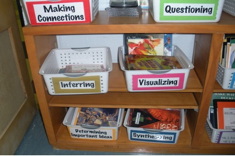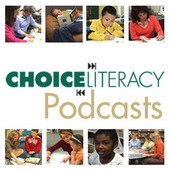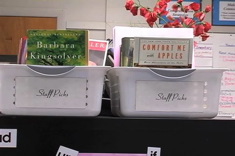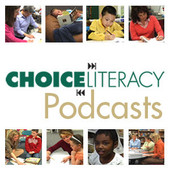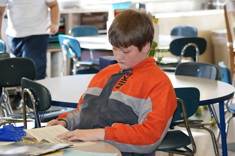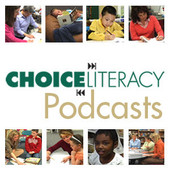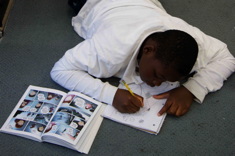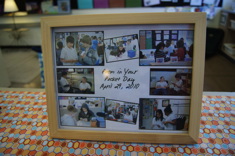Articles
Here is where you’ll find all the latest print features from our contributors. If you’d like to browse specifically by grade level, topic, or contributor, you can use the links in the right sidebar.
Latest Content
What Matters Most: A Conversation with Samantha Bennett (PODCAST)
Samantha Bennett is the author of That Workshop Book: New Systems and Structures for Classrooms That Read, Write, and Think, and works with teachers and literacy leaders across the country to create vibrant school learning communities. In this podcast, she chats with Franki Sibberson about what matters most in schools.
It May Be a Mess, But It’s Our Mess: Creating a Student-Organized Classroom Library
Jennifer McDonough explains why it’s important for her to share the sorting, categorizing, and labeling of texts with her students early in the year while organizing the classroom library.
Books with Overlooked Potential for Launching the School Year (and Ideas for Using Them with Students)
You know those books that cause us to say, “Aww…I love that book.” Well, the team at Literacyhead has us thinking about using old favorites in new ways.
The Power of Linking Words and Perceptions
Melanie Quinn relays a powerful practice for staff members to reframe language and perceptions while putting common labels for students in a whole new light.
Rethinking Mentor Texts
Shari Frost writes about the ways our perfectly organized bins may limit the teaching possibilities for many books. She takes readers step by step through her process of determining ways to use a sample mentor text to teach a multitude of lessons and strategies.
Sharon Taberski on Book Choice (PODCAST)
Sharon Taberski talks about the teacher’s role in helping students make smart and thoughtful book choices.
Coaching Reluctant Writers
Heather Rader describes how to use "wows and wonders" to reach students who say they hate to write.
From Hearing to Listening
Jennifer Jones finds there is a world of difference between hearing and genuinely listening to the teachers who come to her for support. She shares some simple questions she uses at the start of professional conversations to ensure she is providing the right kind of response.
Using Animated Short Films to Teach Inference
Here’s a problem many teachers share – students are far too literal when it comes to inferring while reading. Ellie Gilbert finds animated short films readily available on the web are a terrific tool for helping students move beyond literal interpretations of text.
Virtual Book Clubs for Teachers
It’s virtually possible to get together around a book without getting together at all. Shari Frost shows us how.
Books for Launching the School Year (and Ideas for Using Them with Students)
We all want students starting school with intention, confidence, community and more. These books from the team at Literacyhead can help.
Aimee Buckner on Nonfiction in Student Notebooks (PODCAST)
Aimee Buckner always has notebooks on her mind and we’re glad because she’s upping the nonfiction and modifying for specific learners’ needs. She’ll tell you more in this podcast.
Getting the Most Out of Visiting a Colleague’s Classroom (PODCAST)
Tammy Mulligan and Clare Landrigan talk with Franki Sibberson about strategies for getting the most out of observing in a colleague’s classroom.
A Bad Case of the Never-Ending Januaries
With a tough winter and tougher budget prospects, many schools will be dealing with the Januaries straight through March. Our contributors have suggestions for dealing with stress, fatigue, and depression to help renew and re-energize your work.
Prewriting is a Party!
Sometimes the most important work for writers takes place before any actual drafting. Heather Rader shows how a simple metaphor can help students understand the importance of planning and organizing drafts.
One Book/Four Hands: Mentoring Younger Readers Using Picture Books
Paul Hankins describes the power of pairing high school and elementary students in a partner reading program.
Lester Laminack on Reading Like a Writer (PODCAST)
In this podcast, Franki Sibberson chats with Lester Laminack about how he reads as a writer, and what teachers might do to develop this skill in their students. Lester is the author of beloved books for children and teachers, including Saturdays and Teacakes and Unwrapping the Read Aloud
.
Big Ideas: Balancing Plans with Authentic Response
Clare Landrigan and Tammy Mulligan learn important lessons about planning, themes, and life when they share Knuffle Bunny with a group of kindergartners.
Kathy Collins on Literacy Homework (PODCAST)
Kathy Collins reconsiders homework for personal and professional reasons in this podcast and generates ideas for homework resulting in fewer tears and more authentic learning.
Newbery Club Wrap-Up
Even though their Newbery Club of 5th graders didn't read the winning book in advance, Maria Caplin and Bill Prosser consider the club a success. They close out their series on the club with thoughts on how they will do things differently next fall.
Tuesday Trading Post: Involving the Whole School in a Book Exchange
Here's a terrific idea for building the home/school reading connection and involving parent groups in literacy. Andrea Smith shares the nuts and bolts of the Tuesday Trading Post, a schoolwide book exchange.
“You’ll Figure It Out”: 10 Tips for Literacy Coaches Who Are Given Little Guidance
Many new literacy coaches find they are not just in a new role—they have the task of developing most of the routines and expectations for this new role on their own. Terry Thompson shares tips for literacy coaches who are given little guidance at the start of the year.
Closing Out the Year (PART 2)
Here are some fresh and fun ideas for closing out the school year from Choice Literacy Contributors Katie Doherty, Gail Boushey and Joan Moser (“The Sisters”), and Mandy Robek. This is the second installment in a two-part series.
Jigsaw Jones and Advocating for Kids: A Conversation with James Preller (PODCAST)
Popular children's book author James Preller talks about his series Jigsaw Jones and being an advocate for kids.
New Fiction for Boys (BOOKLIST)
It takes a kid at heart to share what young boy readers would take to heart, and Tony Keefer is just the guy for the job. Tony loves whonunits, blood ‘n’ guts, and cliffhangers, and he shares that passion with his tween students in this fiction booklist for boys.
How to Look at Student Work
With summaries as an example, Heather Rader uses trends from learners to help make smart instructional decisions about what is presented during whole group, small group and individual time.
An Attitude of Gratitude
Heather Rader gets three nasty emails, and thinks through how to hold on to an attitude of gratitude when dealing with colleagues who are short-tempered or demanding.
Poetry Fridays (and So Much More) for Students and Staff
 Mary Lee Hahn finds Poetry Fridays are about so much more than poetry, or even a pleasant end to the week. She shares how this activity is a wonderful way to bring together colleagues and students.
Harbinger
Shirley McPhillips draws parallels between a tentative, battered robin in the snow and the fragility of teachers in the spring.
Coaching Monkey
Heather Rader has advice for literacy coaches looking for honest appraisals of their work from colleagues.
Browse Content By
Type
Category
- Assessment Tools
- Big Fresh Archives
- Booklists
- Choice Numeracy
- Classroom Design
- Common Core
- Community Building
- Conferring
- Content Literacy
- Digital Literacy
- English Language Learners
- Equity
- Family Relations
- Free Samples
- Guiding Groups
- Leadership
- Literacy Coaches
- Mentor Texts
- Minilessons
- New Teacher Mentors
- Podcasts
- Poetry
- Quote Collections
- Reading Strategies
- Self Care
- Struggling and Striving Learners
- Talking and Listening
- Teacher Study Groups
- Teaching Reading
- Teaching Writing
- Word Study and Vocabulary
Author
- Melissa Quimby
- Nawal Qarooni
- Gwen Blumberg
- Julie Cox
- The Lead Learners
- Hannah Tills
- Josie Stewart
- Ruth Metcalfe
- Mallory Messenger
- Becca Burk
- Jodie Bailey
- Vivian Chen
- Mary Brower
- Tiffany Abbott Fuller
- Stephanie Affinito
- Ruth Ayres
- Leigh Anne Eck
- Heather Fisher
- Shari Frost
- Julie Johnson
- Suzy Kaback
- Gigi McAllister
- Shirl McPhillips
- Melanie Meehan
- Cathy Mere
- Debbie Miller
- Tara Barnett and Kate Mills
- Tammy Mulligan
- Dana Murphy
- Bitsy Parks
- David Pittman
- Brenda Power
- Heather Rader
- Matt Renwick
- Mandy Robek
- Christy Rush-Levine
- Gretchen Schroeder
- Jen Schwanke
- Brian Sepe
- Katherine Sokolowski
- Stella Villalba
- Jennifer Vincent
Grade Level
Choice Literacy Membership
Articles
Get full access to all Choice Literacy article content
Videos
Get full access to all Choice Literacy video content
Courses
Access Choice Literacy course curriculum and training

